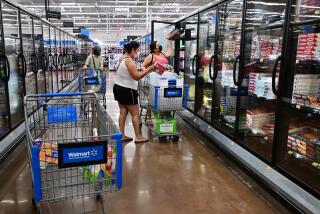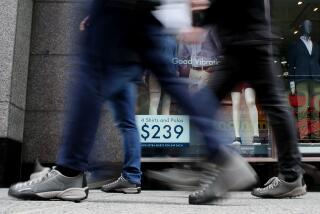Greenspan Optimistic About Recession
- Share via
WASHINGTON — Federal Reserve Chairman Alan Greenspan said Monday that the U.S. recession was losing its punch and sounded hopeful that the 10-month-old downturn will end soon.
In his most upbeat assessment of the outlook since late last year, Greenspan said that the recession was becoming less intense and that America’s economic performance was turning more mixed after months of weakness.
“At the moment we still seem to be in the throes of recessionary forces,” he told a Capitol Hill seminar. “(But) a number of figures are beginning to look more mixed.”
Orders for durable goods--those designed to last more than three years--may be bottoming out, and the housing industry is starting to recover, he said.
The recession hit its depths late last year, and the intensity of the contraction has eased since, he added.
Greenspan said factory production was running below consumption as companies work off inventories--a development he called surprising given the low level of corporate stocks.
“As it is turning out, there is more (inventory) liquidation then many of us would have expected,” he said.
But he is betting that that will end soon and that output will begin to rise.
Greenspan said the biggest question mark facing the economy is whether companies will continue to lay out money to upgrade and build plants and buy new equipment.
Corporate capital spending has held up relatively well despite the recession, which has been mainly caused by steep cuts in output by U.S. auto makers, he said.
If such spending can hold up for the next three to six months, the economy is likely to begin to recover, he said.
“If the recession is prolonged, it is likely to be a consequence of a secondary reaction in the capital goods markets,” Greenspan added.
He also sounded hopeful that the credit crunch crippling the economy will begin to ease soon, although he acknowledged that he saw no “firm signs” of that happening yet.
Forced to write down bad loans, many U.S. banks have become more stingy about extending new credit, and that is hurting the economy.
Greenspan said bad loans at U.S. banks are continuing to rise but at a pace less rapid than before.
More to Read
Inside the business of entertainment
The Wide Shot brings you news, analysis and insights on everything from streaming wars to production — and what it all means for the future.
You may occasionally receive promotional content from the Los Angeles Times.









